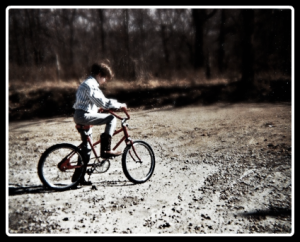 I’ve said often (including just a couple weeks ago) that I decided to become a writer at the age of twelve. Before then, I had other plans. I spent six years telling anyone who would listen that I intended to be an electrical engineer when I grew up.
I’ve said often (including just a couple weeks ago) that I decided to become a writer at the age of twelve. Before then, I had other plans. I spent six years telling anyone who would listen that I intended to be an electrical engineer when I grew up.
That has often stricken me as a funny contrast, especially now that I work surrounded every day by electrical engineers. The job is pretty much the opposite of the one I want. I didn’t always know that, though.
My confusion all started in the summer of my sixth year, when I went to visit my grandparents for a week.
Granddad noticed that I had a habit of spending whole afternoons drawing. When I wasn’t busy helping with chores or pestering him to tell me a story, I was filling my notebook with page after page of pencil sketches.
One evening, when he came to call me to dinner, he found me working on that and chuckled. “Boy, are you going to be an artist when you grow up?”
I shook my head and showed him what I was working on — a ridiculously complex arrangement of gears and springs and pulleys, filling a page, all meant to drive five wheels attached to the bottom of a deformable steel panel. I said, “I’m not going to be an artist. I’m going to be an inventor.”
He sank down next to me, suddenly very serious, and said, “They don’t have inventors anymore. What you need to be is an electrical engineer.”
I repeated the name once, trying it out, and then asked him, “Electrical engineers build things like this?”
“Oh yes,” he said, in the mock serious way one talks to a six-year-old. “They’re the best at making things like this.”
And that was the end of my first and last career counseling session. I closed my notebook and went to dinner. Then I spent the next six years repeating that line. “I’m going to be an electrical engineer.”
There was no question in my mind, no worry how long I’d have to spend in school or what skills I’d need to make good on it. It was a matter of destiny. I had to be an electrical engineer because, without realizing it, my granddad had assured me that electrical engineers were the best at making an army of killer robot dinosaurs to conquer the world.
Before I was through, I had over a dozen spiral notebooks filled with pages covered, front and back, with nothing but detailed schematics. I had a plan, and I knew the career path that would get me there.
The Changing Face of Publishing
When I changed my ambition to storytelling, my career path got a lot less clear. It’s not easy to know how to get from pen and paper and a love of words to a creative writing job that really pays the bills. Depending who you ask the path is sometimes vague, often frustrating, and always cruelly unreliable.
Worse yet, it changes. The writing advice that’ll get you published today isn’t the same as it was yesterday, and signs are pretty clear that it’ll be something different altogether tomorrow (metaphorically speaking). I’ll tell you more about that tomorrow (literally speaking) when we discuss the changing face of publishing, the new market for storytellers, and the direction things are going.
Photo credit Sherry Pogue (Hi, Mom!)






Aaron,
I think we live in one of the most interesting times in history. People are finding their own voice and embracing it. The rules, procedures, and “correct” way to write has been thrown out the window. Like you I think I have found myself on a different path. I remember my first attempts at writing in the high school, which were all kind of a fail. But now each and every one of has the opportunity to build a fan base and a following, regardless of our writing style.
Exactly, Srini. And that’s got to be an exciting thing for artists, because there’s no requirement that the things we create appeal to a mass market — they only have to appeal to enough people to put food on our tables. (Of course, some of us have more expensive tastes than others….)
It’s an exciting time for readers, too, for the same reason. We can now access the things we want, rather than settling for the things a publishing house decided would be commercially viable.
I think the dream of becoming a superstar artist fades a little bit, but that only ever paid out to a tiny percent of hopefuls. In the new market, it should become a lot easier for anyone who wants to (and willing to put in the necessary work) to earn a living wage producing the art they want to produce. That’s a bright future.
Srini, certainly all of my instincts have been misfiring for years. It has – and is – evolving, and at a seemingly faster rate. Huge opportunity for those that can abandon the old non-working models to fully embrace new models which do work.